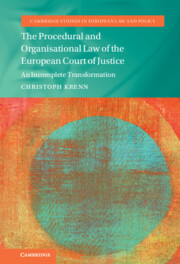Book contents
- The Procedural and Organisational Law of the European Court of Justice
- Cambridge Studies in European Law and Policy
- The Procedural and Organisational Law of the European Court of Justice
- Copyright page
- Contents
- Figures
- Preface
- Acknowledgements
- Table of Cases
- Abbreviations
- 1 Introduction
- 2 What Courts Do
- 3 On the Template of the ICJ
- 4 Luhmann in Luxembourg
- 5 Completing the Transformation
- 6 Conclusion
- Bibliography
- Index
6 - Conclusion
Published online by Cambridge University Press: 15 September 2022
- The Procedural and Organisational Law of the European Court of Justice
- Cambridge Studies in European Law and Policy
- The Procedural and Organisational Law of the European Court of Justice
- Copyright page
- Contents
- Figures
- Preface
- Acknowledgements
- Table of Cases
- Abbreviations
- 1 Introduction
- 2 What Courts Do
- 3 On the Template of the ICJ
- 4 Luhmann in Luxembourg
- 5 Completing the Transformation
- 6 Conclusion
- Bibliography
- Index
Summary
In this book, I have argued that the ECJ’s procedural and organisational law has for a long time ideally fit the Court’s role in the EU’s political system but that this is no longer the case. The ECJ’s mandate has developed, and the Court’s model of decision-making should follow suit. The normative framework to develop this argument has been built on the works of three legal and political theorists: Christoph Möllers, Niklas Luhmann and Jürgen Habermas. While Möllers has helped to understand the ECJ’s original design, Luhmann’s and Habermas’ contrasting visions on the role of courts have allowed to conceptualise the main tension underlying the current ECJ procedural and organisational law. Luhmann speaks the technical language of administration and organisation. Life is complex. Things need to work. To reduce uncertainty and foster stability is what the legal system and courts are for. Jürgen Habermas offers a different perspective. He seeks to open the cold world of legal rules to a public and equal discourse on what is right and just. Justice is for Habermas much more than courts deciding like cases alike. Courts need to aim making decisions that everyone affected can potentially agree to.
- Type
- Chapter
- Information
- The Procedural and Organisational Law of the European Court of JusticeAn Incomplete Transformation, pp. 155 - 157Publisher: Cambridge University PressPrint publication year: 2022

